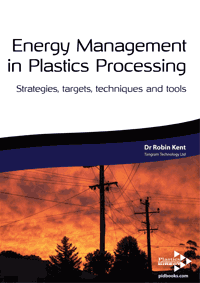plasticker-News
| 29.05.2008 | Lesedauer: ca. 3 Minuten |

|
[Die folgende Meldung liegt nur in englischer Sprache vor]
New Book: ‘Energy Management in Plastics Processing’
|
Practical energy-saving advice for all plastics processors Plastics Information Direct, the technical publishing division of Applied Market Information Ltd. (www.amiplastics.com), has published a brand new book which could help all plastics processors to manage and reduce their energy consumption. Written by industry expert Robin Kent, the book is called Energy Management in Plastics Processing: Strategies, targets, techniques and tools (Picture). At a time when many plastics processors face global competition, the rising price of oil impacts both raw materials and energy costs. Current energy costs at manufacturing sites are generally around 4-8% of turnover, and for many plastics processors this will equal or even exceed their profit margin. For some sites, energy costs exceed direct labour costs. Reducing energy spend can clearly improve profitability, or even make the difference between success and failure. So why do so many managers still view their energy bill as an uncontrollable overhead? It is important to understand where most energy in consumed. Switching off lights and turning down the heating can send out important messages to staff, but the savings will be small. Plastics processing machinery will probably account for two thirds of your consumption, so efficient motors and appropriate insulation can make a big difference. Factory services such as compressed air are often taken for granted, but leaking air equates to wasted cash. Established practices may be wasteful, and short-term investment decisions may have long-lasting consequences. Dr Kent has visited plastics factories around the world, observing and advising on energy management. In this new book he describes a structured approach to energy management, and the practical measures which can permanently reduce energy consumption at a typical site by around 30%! This is a workbook, designed to be used on a daily basis. Managers can evaluate their current strengths and weaknesses in energy management, and benchmark their consumption against real industry data, before implementing a strategy for improvement. Guidance is provided on carrying out effective site surveys, and all areas of a typical processing operation are considered. Topics are broken down and presented in two-page sections, enabling managers to tackle and resolve each issue before moving onto the next. Tools are provided for monitoring progress, and key tips for energy-efficiency are offered throughout the book. Energy Management in Plastics Processing: Strategies, targets, techniques and tools is available in softbacked format, with 271 pages, and contains more than 250 figures and tables. It is priced at €110 or £80 or $160 (plus delivery). The book can be ordered online from www.pidbooks.com, or from the publications department at Applied Market Information Ltd, AMI House, 45-47 Stokes Croft, Bristol BS1 3QP, United Kingdom, Telephone: +44 (0)117 924 9442, Fax: +44 (0)117 989 2128, pidbooks@amiplastics.com. |
Applied Market Information Ltd., Bristol, UK
» insgesamt 11 News über "AMI" im News-Archiv gefunden
Ihre News im plasticker? Bitte senden Sie Ihre Pressemitteilungen an redaktion@plasticker.de!
| » zurück zum Seitenanfang |












 Wir informieren Sie schnell, umfassend und kostenlos über das, was
in der Branche passiert.
Wir informieren Sie schnell, umfassend und kostenlos über das, was
in der Branche passiert.

